

How a calamitous century
helped win us our rights
![]()
By Claire Wolfe, July 19th 2014
JPFO writer contributor, © 2014.
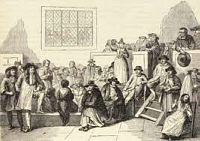 When I'm in a, shall we say, mellow mood with friends, I can occasionally launch into accounts of politics in seventeenth-century England.
When I'm in a, shall we say, mellow mood with friends, I can occasionally launch into accounts of politics in seventeenth-century England.
This usually results in incredulous stares, followed by, "Oh, so sorry. Fascinating story, I'm sure. But it's really just hours past my bedtime."
It's a shame anybody should feel that way, though. Because even in the hands of a dreary lecturer and deadly bore (um, not saying I am one), the story of seventeenth-century England is one of riotously awful chaos -- and the birth of modern freedom.
Sit down. Have another drink. Let's talk about it.
You people who are real experts on history, feel free to correct me because I am no deep researcher. But here's an opinionated summary of that fabulously catastrophic century (followed by a few thoughts about our own).
The seventeenth century in England started with a bad transition. In 1603 the Virgin Queen Elizabeth died and, after decades of playing coy (and playing politics) about the secession, left her throne to James VI of Scotland. He became James I of England.
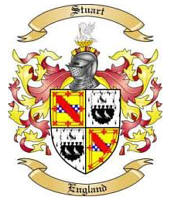 A scholar, but a poor ruler, James I was called "the wisest fool in Christendom." Notably, he was also the first of the Stuart monarchs.
A scholar, but a poor ruler, James I was called "the wisest fool in Christendom." Notably, he was also the first of the Stuart monarchs.
The Stuarts -- there were four -- did for more to bring Britain to its knees -- and its senses -- than anything else I can think of.
James I wasn't popular. But he lived a full-length royal life. His son, Charles I ... was beheaded.
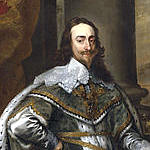
Charles I
Charles I is the only king of England ever legally executed and some British monarchists still beat their breast over what an awful, disrespectful thing their ancestors did. Silly people! It may have been the smartest thing the English did since forcing the Magna Carta on a much earlier king.
But the Great Charter was imposed by nobles. In the seventeenth century in England, something new was being born. A middle class. The country had prospered in the long reign of Elizabeth and now it was filled with newly strong merchants and similar types, ready to hold and test their own power.
This class was beginning to asssert (backed by ancient common law and their representatives in Parliament) that, no matter how exalted the king, they themselves had rights that no one had any authority to infringe. They often understood those rights quite differently than we do. But it was a beginning.
The brilliant Stuarts did not deign to recognize that "the times they are a changin.'" As powerful people so often do at pivotal moments in history, the Stuarts dug themselves even deeper into monarchy. They proclaimed their "divine right" to rule.

Paul Begala, advisor
Now I don't know if that idea had been around for some time and they just decided to run with it. Surely some king -- surely many kings -- had thought themselves divinely chosen and divinely privileged to rule over others. Advisors must have encouraged it, rather like today's presidential advisors urge their bosses to rule by "phone and pen" and chortle, "Stroke of the pen. Law of the land. Kinda cool!" But the Stuarts made "divine right" to rule their own.
James I himself wrote two official texts on his divine authority, in which he claimed that kings were inherently higher beings than other men and that parliaments were merely "head courts" serving at his whim.
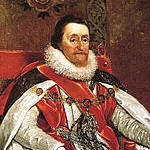
James I
But you know, when newly awakened people are beginning to see you as the biggest barrier between them and their liberties, you're likely to lose. James ruled for 22 years, but had endless trouble from those "inferior" common folk who increasingly failed to share his exalted view of himself. In 1649, Charles I decisively lost -- about the top 12 inches of his royal self.
This involved a series of wars and an enormous shift in power. England, which had had a king back into the dark recesses of ancestral memory, decided to go kingless. Keep score now: We already have one regicide, three Civil Wars, and a radical change in the concept of government and it's only mid-century.
Another idea about freedom ascendent just then was the nascent concept of freedom of religion.
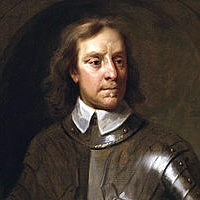
Oliver Cromwell
Unfortunately -- as is always the case -- some of the folks who believed this most ardently actually believed in freedom of religion for them and those they favored, not necessarily everybody else. It was one of this bunch who rose to power as England lost its head and was ready to follow any strong presence who promised to lead it. Thus England (and my unfortunate ancestors in Ireland) got Oliver Cromwell -- the "Lord Protector."
This, too, did not go well.
Eventually, when Cromwell died, his son -- and isn't that just rich for people who beheaded a king? -- suceeded. He lasted nine months before Parliament, backed by an army, asked Charles I's son to please come back and lord it over them.
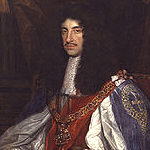
Charles II
Charles II was a Stuart to the core of his no-doubt pickled liver. But because he spent most of his time having famous mistresses and fathering squads of illegitimate children, providing entertaining fodder for Ye Olde Nat'l Ennquirer England put up with their "Merry Monarch." He lived out his life of decadence, luxury, and blessed neglect of state business and was suceeded by his brother James II.
Right in the middle -- 1665 and 1666, during the reign of Charles II -- first the bubonic plague returned, then the city of London burned down. It was just that kind of century.
Only long after that do we get to James II.
Jamestoo was no better or worse than the rest of the "divine-righting" Stuarts. But his wife and his would-be heir were Catholic and he was pro-French, which didn't sit well with the overwhelmingly Protestant country. He lasted through three years (1685 to 1688) and two rebellions.
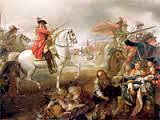 In 1688 we reach the Glorious Revolution. Which was -- to the vast relief of England's weary citizen-subjects -- largely bloodless. Jamestoo was sent packing off to Europe, where he nurtured both resentments and future pretenders to the throne. England extended its hand to his solidly Protestent daughter Mary and her spouse, the Dutchman, William of Orange, and made them joint monarchs.
In 1688 we reach the Glorious Revolution. Which was -- to the vast relief of England's weary citizen-subjects -- largely bloodless. Jamestoo was sent packing off to Europe, where he nurtured both resentments and future pretenders to the throne. England extended its hand to his solidly Protestent daughter Mary and her spouse, the Dutchman, William of Orange, and made them joint monarchs.
Yes, yes, the English still had themselves hereditary rulers. But the people could stand their own ground against them now. The Irish and Scots still didn't have it too good, but the English got some breathing space.
Thus ended that calamitously powerful century.
The chaotic century taught the English many things -- for instance that genuine freedom of religion is better than having to endure anybody's enforced theocracy, of whatever brand or sect.
Another thing these experiences began to teach ordinary men and women (mostly men at that time, of course) is the importance of being armed. Of being free to be effectively resist unjust power.
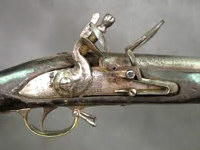 Not just to be armed against freelance brigands, but against illegitimate authority at every level. For instance, it had long been a theoretical principle of common law that an innocent person (and bystanders) had a right to resist the use of illegal force by government officers. In the late seventeenth century and early eighteenth, British courts confirmed this principle and action -- and eventually passed the legal principle to their American colonies. (Not until the 1960s, did a handful of U.S. legal experts and court cases change the right to resist to a "duty to submit.")
Not just to be armed against freelance brigands, but against illegitimate authority at every level. For instance, it had long been a theoretical principle of common law that an innocent person (and bystanders) had a right to resist the use of illegal force by government officers. In the late seventeenth century and early eighteenth, British courts confirmed this principle and action -- and eventually passed the legal principle to their American colonies. (Not until the 1960s, did a handful of U.S. legal experts and court cases change the right to resist to a "duty to submit.")
Having thrown off the "divine" might of kings, the proud people of England weren't about to put up with tyrants, large or small.
Now they were armed against tyranny at every level -- armed with hardware, armed with the rich, increasingly individualist philosophies of the Enlightenment, and armed with the experience of overthrowing dictators and putting dictatorial agents in their place.
And these are the experiences, traditions, and adamant convictions the English colonists brought with them to America.
 This is where Americans come from. And this is true even for those of us whose ancestors played no part in the events of that catastrophic century. Whatever else we are, wherever our families came from, we are the inheritors of this hard-won legacy as it came to be expressed in the American Revolution, the Declaration of Independence, and the Bill of Rights.
This is where Americans come from. And this is true even for those of us whose ancestors played no part in the events of that catastrophic century. Whatever else we are, wherever our families came from, we are the inheritors of this hard-won legacy as it came to be expressed in the American Revolution, the Declaration of Independence, and the Bill of Rights.
Yet now most people unquestioningly accept their "duty to submit" to all agents and all diktats of the state. We accept "sovereign immunity", the doctrine that the king -- or the state and its officers -- can do no legal wrong. Increasingly, we take for granted rule by "phone and pen." Our alleged representatives hand over their authority to bureaucrats, presidents, and corporate oligarchy. Government has become a means to vast wealth for the already-powerful and connected. Virtually every part of the Bill of Rights has been twisted and infringed out of recognition.
Nobody uses the words "divine right," but we've come 'round to that part of the circle again -- the place where government is generally above the law and We the People are expendable.
Somehow -- remarkably -- through all this we've kept our right to bear arms. It's been nibbled away on the edges, certainly. We've lost many specific aspects of it. But here we stand.
And here we must and will stand.
Anti-gunners scoff at the notion that mere citizens with mere small arms could ever overthrow the power of a state, let alone the an overwhelmingly rich and powerful military state.
And let's hope -- ardently -- that we never have to try. Few things are less civil than "civil" conflicts. But the philosophical forebears of the U.S. faced down and overcame "divine" kings, and in so doing they helped give us the great and messy gift of freedom. Today all around the world the littlest of little people,  armed with cheap AKs, determination, and bigger arms seized from their enemies, prevail -- for good or ill. Little people do overcome great odds and great powers.
armed with cheap AKs, determination, and bigger arms seized from their enemies, prevail -- for good or ill. Little people do overcome great odds and great powers.
Let's hope it never comes to that. But if it does, let's hope we do it for the good. We will if we manage to remember the great lesson of our history -- that individuals and our honest rights -- everyone's honest rights -- matter more than all the might of rulers.
Was this information useful to you? If so, please consider donating, becoming a member or renewing your membership, or buying a DVD, book, tee-shirt, or other gear at our JPFO store.
Claire Wolfe hit the Internet back in 1996 with 101 Things to do 'Til the Revolution, which was followed by several other books. She came to the attention of JPFO's founder, Aaron Zelman, and became one of his main writing partners for seven years. Together they authored The State vs the People and the young-adult novel RebelFire: Out of the Gray Zone. She is the author of The Freedom Outlaw's Handbook (successor to 101 Things), writes a monthly column in S.W.A.T. magazine and blogs regularly at Backwoods Home. The Claire Wolfe Archive




































